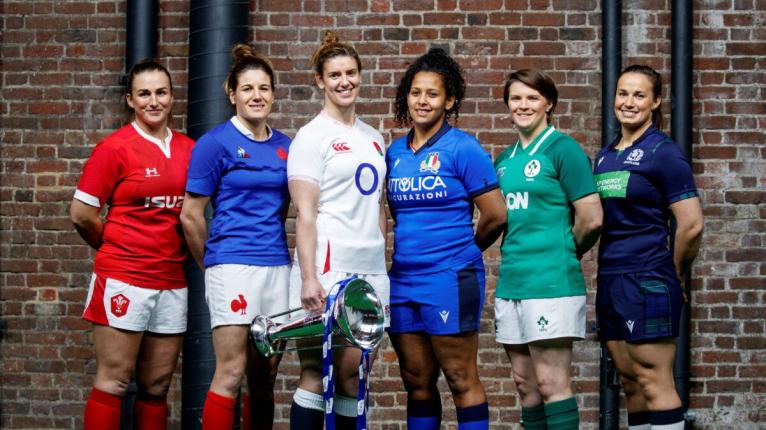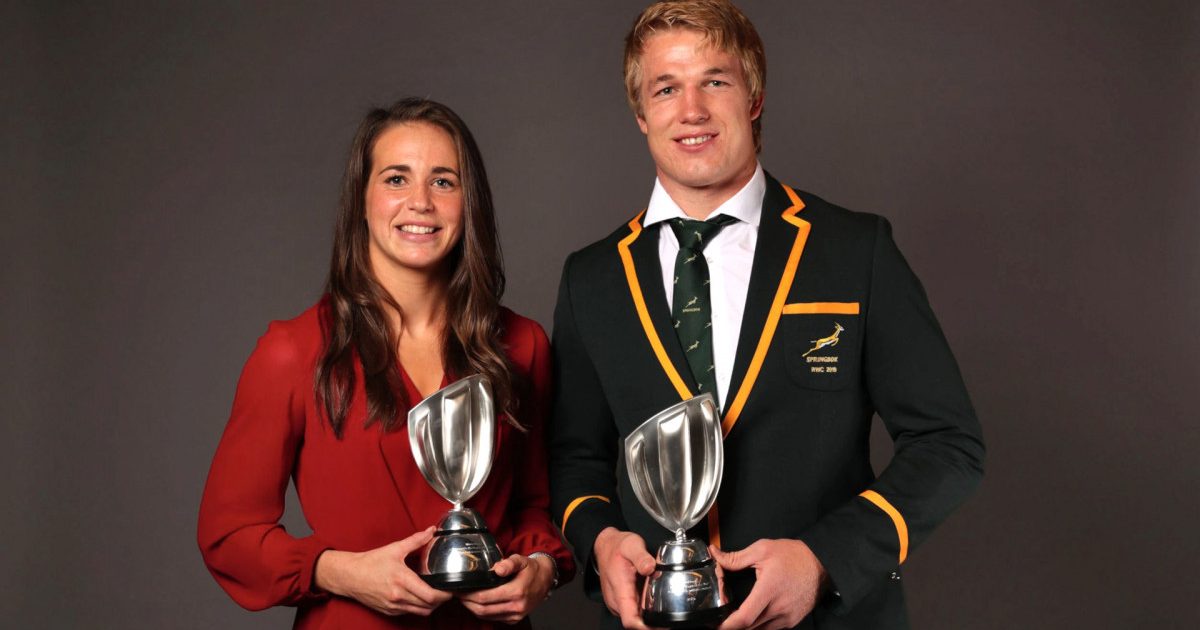Male rugby stars need to help women's game stand up to trolls

Last week was a big week for women’s rugby, with reactions to the postponement of the Women’ Six Nations leading to the #ICare movement, and a two-week break in the Premier 15s as cases of coronavirus rise in the UK.
Most women’s rugby fans accepted that the postponement of the Women’s Six Nations was the sensible decision, with many recognising the opportunity this presents for the tournament to stand on its own. Of course, there were trolls who chose to comment online that “nobody cares” about women’s rugby. It’s an arrogant take known all too well by women’s rugby fans, or fans of any sport not quite in the mainstream. It’s the exact kind of comment that I spoke about in my column a few weeks ago about the social media trolling experienced by women’s rugby players.
Wales and Bristol Bears fly-half Elinor Snowsill explained her thoughts well: “I don’t particularly care about men’s football, so when I see a post about men’s football, what do I do? I continue scrolling & don’t give it a second thought. I get on with my life. I certainly don’t waste precious time commenting on men’s football posts about the fact that I don’t care.
“Do those men trolling articles about women’s rugby genuinely think we are going to believe them when they say they don’t care? Are they really that stupid? The simple act of commenting to declare the statement proves the opposite to be true.
“#ICare about my sport, as do millions others.”
Snowsill has explained this so perfectly. It doesn’t matter if you don’t care, there are many who do. I applaud every women’s rugby player and fan who has decided to take a stand this week. As with the #IAmEnough movement in 2020, women’s rugby players and supporters started a campaign to voice their anger about trolling on social media. It’s a credit to the players that these campaigns raise such attention. Since the #ICare movement started, support has been shown by World Rugby, Sir Bill Beaumont, and many other women’s players such as England and Bristol Bears prop Sarah Bern.
I wish standing up to these trolls wasn’t a responsibility solely afforded to the women’s players. As rugby commentator Nick Heath said, how great would it be if more men’s rugby players showed that they cared? It would be brilliant if the men Tweeted their support. It does happen occasionally, and two examples that spring to mind are George North and Sam Warburton showing support for Wales Women. Saracens player Ben Harris also shared his support for the #ICare movement.
Women's rugby players don't 'need' men's players but while many of these apparent "I don't care" social media trolls seem to be following rugby pages / accounts to begin with, it might help if more high profile men's players showed some #icare support for the women's game.
— Nick Heath (@nickheathsport) January 15, 2021
To echo Heath, the women do not need validation from the men, they are accomplished athletes in their own right. But the men could play a crucial role in stopping these trolls. I believe that the dislike of women’s rugby is often born from misogyny, and hearing other men express their interest in women’s rugby may make the trolls switch on or at least realise that the world has moved on. Snowsill agreed with this viewpoint, Tweeting: “the trolls are likely to be following male players. As female players we can tweet as much as we like to try and change attitudes but it’s likely it won’t even reach the people it’s aimed at!” Twitter is an echo chamber. Those following women’s rugby players probably already support them. Heath is absolutely right, let’s get the men to show their support.
If that feels too forced, then of course we will get more people watching women’s rugby if we truly make it a spectacle. As I said last week, the postponement of the Women’s Six Nations gives us the opportunity for some change. I hope the Six Nations organisers make sure that there are no overlapping games, which mean you can’t watch every game in the tournament. I hope (as has been rumoured) that all games are available to watch on television, without having to stream one game on your phone while watching England play on Sky Sports.
Above all, I hope they make it an exciting tournament. In my opinion, the England v France match should be the last of the competition. It’s usually the game that decides the winner and having the game in the first round (like last year) kills any momentum during the tournament.
I have my concerns that the pandemic has widened the gap between England and the other countries, as so many players from other countries haven’t been able to play domestic rugby this season. England’s Premier 15s is the only league up and running, but many players from Ireland, Scotland and Wales have been playing for English clubs this season, which is a massive improvement from the domestic rugby available there. Last week, I spoke to Wales Women’s skills coach Rachel Taylor, who said that the move for many Welsh players to the Premier 15s has been a positive step for Wales Women. The domestic women’s game in Wales is struggling, with many playing for a club and regional side, where games are few and far between. Many Wales stars travel to clubs close to the border such as Bristol Bears and Gloucester Hartpury.

Last week it was announced that the Premier 15s has been suspended for two weeks. Sunday Times journalist Rebecca Myers reported yesterday that the tournament organisers are using this two-week break as a chance to sort out the testing protocols in the tournament, as so far the league has had no testing provisions. Players have taken to Twitter to voice their concerns, with Harlequins player Kristine Sommer Tweeting on 4 January: “Here’s a question – do we think Women’s Premiership will bring in testing to keep players safety up? Asking for myself and all current women’s players.”
She continued: “I’ll say it 100,000 times how grateful I am to play rugby in the UK, but when is player safety a concern? No real bubbles – no testing. This should be discussed, right?”
The Premier 15s is the highest level of domestic women’s rugby in England, and the elite league attracts players from around the world. It’s a mixture of professional, semi-professional and amateur players. Many have full-time jobs outside of rugby, and testing should be a necessity for the league to continue and for player safety to be taken seriously. I really see no excuse for this not to happen, especially with the new more infectious variants of coronavirus spreading rapidly across the UK. The RFU needs to make sure that all clubs can test their players before the league resumes.
Believing that the women’s game will only be paused for two weeks mirrors the optimism I had in March 2020 for a three-week lockdown. Unfortunately, I think this suspension may be extended, but that can be a good thing if the game becomes safer and we don’t have to cancel fixtures.
"Watching England win 53-0 against Scotland is not a great advert for women’s rugby."
There's a considerable upside to postponing this year's Women's Six Nations, a tournament that needs a solid kick up the backside, argues @_JessHayden ??? #sixnationshttps://t.co/e9I66y9bUE
— RugbyPass (@RugbyPass) January 11, 2021
This suspension comes despite the law variations that have been in place in the Premier 15s to reduce face-to-face contact. The number of scrums has reduced by 75 per cent, by initiatives such as playing advantage after a knock-on instead of a scrum. There are now free kicks awarded to the opposition for a forward pass rather than a scrum, and there is no longer the option for a scrum at a free kick or penalty.
The laws around the maul have also changed. A maul may only stop once, and no players who were not in the starting line-out can join a maul. Line-outs can also only be driven in the 22-metre zones to reduce the number of mauls. Fewer scrums and mauls means more ball in play time, which results in a faster game.
I recently spoke to England prop Hannah Botterman about the law variations. She has only played 26 minutes under the new law variations before sustaining an ankle injury, but thinks they are a necessity to the game. The only downside, despite more running, is not being able to compete at scrums. The prop says that it means smaller mistakes like knock-ons have a huge effect on the game, as they effectively hand a “free pass” to the opposition.
I would like to see these variations continue at the international level, at least for this season. The variations certainly make the game faster, and the difference to the men’s game gives it that edge that might make it a spectacle for those wondering what can be done in the men’s game to open it up and quicken the pace.
2021 is a year to be creative, and I’ll support any efforts by our game’s lawmakers to make women’s rugby a better spectacle for fans. It’s fine to say #ICare, now let’s make everyone else.











































































